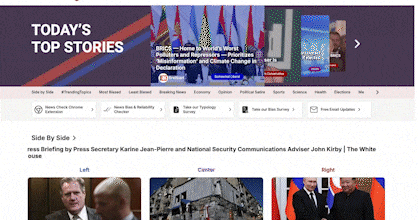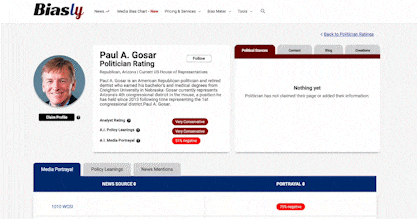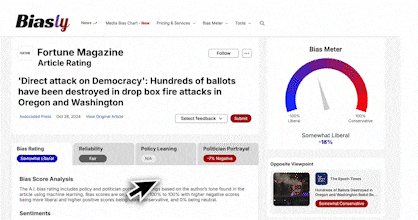 Yahoo News Article Rating
Yahoo News Article RatingGulf between public and private sector pay widens under Starmer
- Bias Rating
-18% Somewhat Liberal
- Reliability
40% ReliableAverage
- Policy Leaning
-18% Somewhat Liberal
- Politician Portrayal
N/A
Continue For Free
Create your free account to see the in-depth bias analytics and more.
Continue
Continue
By creating an account, you agree to our Terms and Privacy Policy, and subscribe to email updates. Already a member: Log inBias Score Analysis
The A.I. bias rating includes policy and politician portrayal leanings based on the author’s tone found in the article using machine learning. Bias scores are on a scale of -100% to 100% with higher negative scores being more liberal and higher positive scores being more conservative, and 0% being neutral.
Sentiments
-22% Negative
- Liberal
- Conservative
| Sentence | Sentiment | Bias |
|---|---|---|
Unlock this feature by upgrading to the Pro plan. | ||
Reliability Score Analysis
Policy Leaning Analysis
Politician Portrayal Analysis
Bias Meter
Extremely
Liberal
Very
Liberal
Moderately
Liberal
Somewhat Liberal
Center
Somewhat Conservative
Moderately
Conservative
Very
Conservative
Extremely
Conservative
-100%
Liberal
100%
Conservative

Contributing sentiments towards policy:
58% : Government departments have recommended a 2.8pc pay rise next year, slightly above a predicted 2.6pc average inflation rate.57% : Average monthly pay in the public sector - including education, health and public administration services - surpassed £2,640 in November, the Resolution Foundation said, while the equivalent for the private sector stood at £2,500.
51% : Public sector employees are paid around 6pc more than those in the private sector, according to analysis of official data by the Left-leaning Resolution Foundation think tank - a gap three times greater than at the start of the year, when it stood at around 2pc.
49% : "Now that we have wiped the slate clean, public spending needs to live within the means that we've set out for it, and we are focused on delivering our Plan For Change which includes kickstarting economic growth through investment and reform, improving living standards for everyone."
47% : Her spending plan, which set out a record £40bn in tax rises, included an increase in employer National Insurance contributions from 13.8pc to 15pc, and a lowered threshold at which employers become liable to pay the tax, from £9,100 to £5,000 per year.
42% : Mr Brewer noted that it is a "gloomy outlook" for higher-income households, since they do not rely on public services as much, benefit less from rises in minimum wages and will get a reduced income from savings as interest rates fall.
*Our bias meter rating uses data science including sentiment analysis, machine learning and our proprietary algorithm for determining biases in news articles. Bias scores are on a scale of -100% to 100% with higher negative scores being more liberal and higher positive scores being more conservative, and 0% being neutral. The rating is an independent analysis and is not affiliated nor sponsored by the news source or any other organization.




























